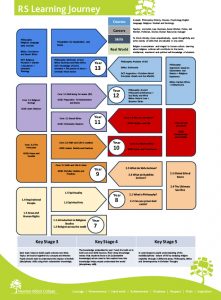Intent
The intention of the RS curriculum at NAC is to explore what people believe and what difference this makes to how they live and understand the world. This is so pupils can gain the knowledge, understanding and skills needed to handle questions raised by religion and belief, reflecting on their own ideas and ways of living. The intent is to help pupils to make sense of, make connections between and understand the impact of a range of religious and non-religious beliefs that reflect the local, national, and international milieu.
Our aim is for students to be able to:
- describe, explain, and analyse beliefs and concepts in the context of living religions using appropriate vocabulary
- recognise how and why sources of authority (e.g., texts, teachings, traditions, leaders) are used, expressed, and interpreted in different ways
- explain how and why people express their beliefs in different ways with links to their local community and the wider pattern of belief across the world
- give examples of how and why people put their beliefs into action in different ways
- think critically and challenge the ideas being studied, responding thoughtfully and creatively giving good reasons for their responses
- experience studying religion through the lenses of Philosophy, Theology, and the Social Sciences
*with reference to the Devon and Torbay Agreed Syllabus for RS 2019-2024



